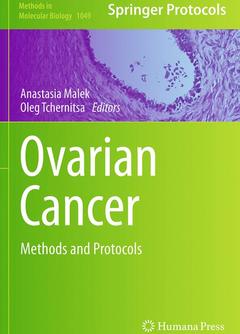Description
Ovarian Cancer, Softcover reprint of the original 1st ed. 2013
Methods and Protocols
Methods in Molecular Biology Series, Vol. 1049
Language: English
Subject for Ovarian Cancer:
Approximative price 116.04 €
Subject to availability at the publisher.
Add to cartSupport: Print on demand
515 p. · 17.8x25.4 cm · Hardback
Description
/li>Contents
/li>Comment
/li>
Ovarian cancer is the most lethal malignancy of the female reproductive system and is also the fifth leading cause of cancer death in women. Sharing common characteristics of cancer, ovarian malignancy possess several clinical and biological particularities In Ovarian Cancer: Methods and Protocols, expert researchers in the field provide methods that have been created or adapted to study various aspects of ovarian cancer. These methods and techniques are applicable to study genetic alterations present in ovarian cancer, structural and metabolic features of ovarian cancer cells, include in vitro and in vivo models that recapitulate ovarian cancer development and progression, and describe ovarian cancer-oriented drug delivery approaches. Methodological chapters are grouped into seven thematic parts, any of them is introduced by short subject review. Written in the highly successful Methods in Molecular Biology series format, chapters include introductions to their respective topics, lists of the necessary materials and reagents, step-by-step, readily reproducible laboratory protocols, and key tips on troubleshooting and avoiding known pitfalls.
Authoritative and practical, Ovarian Cancer: Methods and Protocols seeks to aid scientist to optimize study designs, to correctly select the most applicable methods, and to produce interesting and novel results.
Ovarian Cancer Genome.- Identifying Associations Between Genomic Alterations in Tumours.- Analysis of Genome-wide DNA Methylation Profiles by BeadChip Technology.- Integrative Prediction of Gene Function and Platinum Free Survival from Genomic and Epigenetic Features in Ovarian Cancer.- Survival Prediction Based on Inherited Gene Variation Analysis.- Main Principles and Outcomes of DNA Methylation Analysis.- Methylation-specific PCR.- Bisulfite Sequencing of Cloned Alleles.- Bisulfite Pyrosequencing.- RNA Networks in Ovarian Cancer.- Microarray-based Transcriptome Profiling of Ovarian Cancer Cells.- Deep Transcriptome Profiling of Ovarian Cancer Cells using Next Generation Sequencing Approach .- Assessment of mRNA Splice Variants by qRT-PCR.- Micro-RNA Profiling in Ovarian Cancer.- Detailed Analysis of Promoter-associated RNA.- Integrating Multiple Types of Data to Identify MicroRNA-gene Co-modules.- Energy Metabolism and Changes in Cellular Composition in Ovarian Cancer.- Metabolomic Profiling of Ovarian Carcinomas using Mass Spectrometry.- Choline Metabolic Profiling by Magnetic Resonance Spectroscopy.- Proteomic Profiling of Ovarian Cancer Models using TMT-LC-MS/MS.- Characterization of Signalling Pathways by Reverse Phase Protein Arrays.-N-Glycosylation Analysis by HPAEC-PAD and Mass Spectrometry.- In vivo and in vitro Properties of Ovarian Cancer Cells.- Establishment of Primary Cultures from Ovarian Tumour Tissue and Ascites Fluid.- Ovarian Cancer Stem Cells Enrichment.- Assessment of Resistance to Anoikis in Ovarian Cancer.- Analysis of EMT by Flow Cytometry and Immunohistochemistry.- Challenges in Experimental Modeling of Ovarian Cancerogenesis.- Transformation of the Human Ovarian Surface Epithelium with Genetically-defined Elements.- In vitro Model of Spontaneous Mouse OSE Transformation.- Orthotopic, Syngeneic Mouse Model to Study the Effects of Epithelial-Stromal Interaction .- Immunocompetent Mouse Model of Ovarian Cancer for in vivo Imaging.- Drug Delivery Approaches for Ovarian Cancer Therapy.- Polymer-Based Delivery of RNA-Based Therapeutics in Ovarian Cancer.- Ligand-coupled lipoprotein for ovarian cancer-specific drug delivery.- Mesoporous Silicon Particles for Sustained Gene Silencing.- Exosomes as a Potential Tool for a Specific delivery of Functional Molecules.
These books may interest you

Ovarian CancerMethods and Protocols 210.99 €



